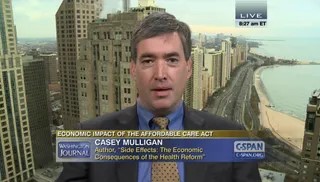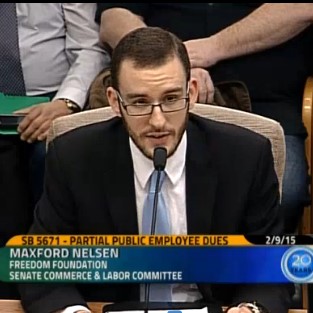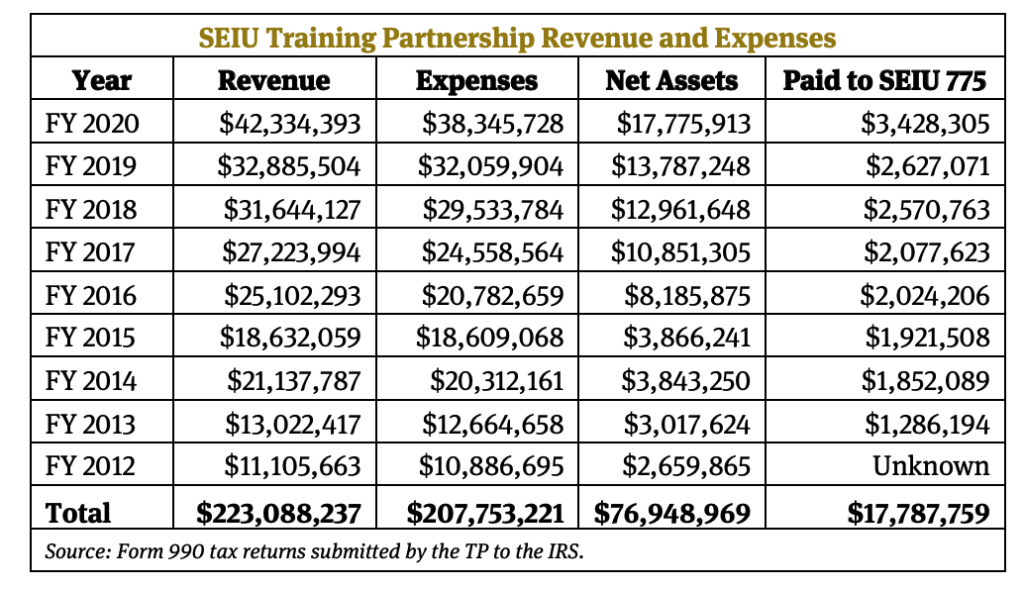Unions could potentially dominate home health care if the Build Back Better Act (BBBA) plan is passed through the reconciliation process, and the Biden administration hopes Americans won't notice. On Wednesday, Maxford Nelsen, Freedom Foundation Director of Labor Policy, wrote a comprehensive Executive Summary and report detailing the impact if passed.
The Oct. 28 BBBA language pertaining to home and community-based services (HCBS), Nelsen explains in his Executive Summary the funding for Medicare will be massive. He say there will be:
"[A] vast expansion in Medicaid funding for home and community-based services (HCBS) that provide in-home care to, and prevent the institutionalization of, adults with functional disabilities. Such services are provided via state-designed-and-operated programs operating within federal parameters."
Moreover, while the exact funding numbers have yet to be hammered out, Medicaid expansion is one of the more expensive items. It is an item that will probably benefit unions, steering:
"Potentially billions of dollars in Medicaid funds to unions representing home care aides, like the Service Employees International Union (SEIU) and American Federation of State, County and Municipal Employees (AFSCME).
"As a condition of receiving the additional funding, states must implement changes to their HCBS programs designed to encourage the unionization of home care aides and are incentivized to use a historically disfavored model that would allow unions to force caregivers to pay dues as a condition of employment in states lacking right-to-work protections. Further, federal grant funds are made available to go directly to union-operated training programs for home care aides."
 Casey B Mulligan/Screenshot C-Span
Casey B Mulligan/Screenshot C-Span
Casey B. Mulligan, with the Committee to Unleash Prosperity, wrote in October the "hidden and hefty penalties" in the BBBA will be crushing to those who do not comply with vaccine policies, for example. They also concur that non-union businesses, agencies, and workers will suffer mightily.
"For example, the penalty for a large (100+) employer to employ an unvaccinated person is between $50,000 and $700,000 per violation and an additional $70,000 per day. This could amount to $26 million for every year that each unvaccinated person remains on the payroll."
Unions will be given favorable tax breaks in their dues "allow[ing] union dues to be deductible from federal income tax, putting about $400 million per year on the union side of the economic scale," writes Mulligan.
The BBBA provision encourages states to unionize home care aides. In the states that lack right to work protections, unions would be able to force caregivers to pay dues "as a condition of employment." Furthermore, union-operated home care training programs "would benefit directly from federal funding grants."
$1 billion in grant funds to be allocated over 10 years is currently in the BBBA. Those entities "include labor unions and affiliated funds, as well as state and local governments and Indian tribes."
Additionally, Nelsen explains that Sec. 30711 of the BBBA appropriates $130 million, "to remain available until expended," for "HCBS improvement planning grants" to states to develop plans to "expand access to home and community-based services and strengthen the direct care workforce that provides such services." The incentives to unionize are set to exert significant pressure on all facets of the home health care universe while potentially circumventing the Supreme Court. Nelsen explains the complicated workaround involving the "concocted scheme" hatched in Washington State.
"In 2018, at the urging of SEIU 775, the Washington State Legislature passed, and Gov. Inslee signed SB 6199, directing the state to hire a private company to manage the workforce of home care aides serving Medicaid clients."
Effectively, this Washington State legislation helped circumvent a prior Supreme Court decision and the National Labor Relations Act that made "traditional unionization" of workers almost impossible. Nelsen writes:
"The state has since hired a vendor to manage the workforce using an agency with choice model and is in the early stages of transitioning caregivers over to the new vendor. According to DSHS, the first pilot group of about 200 caregivers began logging hours for the vendor on Oct. 1, 2021. About 16,000 more will transition over on Feb. 1, 2022, and the remaining 30,000 will transition on Apr. 1, 2022.26 By the summer, caregivers will likely find themselves back where they were before Harris, with nearly $1,000 per year being diverted from their paychecks to SEIU 775 and nothing they can do about it."
"Washington's experience, combined with the fact that the BBBA is using the promise of federal funding to incentivize states to adopt an agency with choice model—which HHS has not historically recommended—strongly suggests the goal is to deprive caregivers of their constitutional right to refrain from union dues payments on a technicality."
 Maxford Nelson, Freedom Foundation
Maxford Nelson, Freedom Foundation
According to Nelsen, Washington State's SEIU-dominated home care system is the blueprint for a nationwide plan to unionize home health care for adults with functional disabilities.
"In Washington, home care aides for Medicaid clients are unionized, with dues deducted from their Medicaid payments by the state. Additionally, the state requires robust training, of questionable utility, for caregivers and pays SEIU to provide it. Finally, the state uses Medicaid funds to pay trust funds affiliated with SEIU to provide health insurance, retirement, and other benefits to caregivers. These entities face little meaningful accountability and typically operate with relatively high operating costs, often paying the union for administration. Overall, nearly three percent of the payroll expenses the state incurs on behalf of HCBS caregivers wind up in union coffers."
The funding for training is a significant revenue source in Washington for the union and was endorsed by voters with the approval of union-backed Initiative 1163. The initiative mandated training for Individual Providers (IPs), which yielded "at best, mixed results" for clients.
The Training Partnership formed in Washington by SEIU 775 "is now the largest such training operation for home caregivers in the country." And, it "collects more in revenue than it expends on training." It represents a monopoly on mandated training, limiting providers' choices, and resulting "in poor customer service, and has made it difficult for some rural providers to access required training."
"The Partnership reported total revenue of $42.3 million on its tax return for FY 2020, and its executive director was paid $245,379.32 SEIU 775 and the Training Partnership share officers, office space, and a call center. And the state's financial obligation towards the Training Partnership has proven lucrative for SEIU 775 as well. In FY 2020, the TP paid $3.4 million—8.1 percent of its total revenue that year—to SEIU 775."
Below is a chart showing SEIU Training Partnership Revenue and Expenses since 2012:
 SEIU Training Revenues and Expenses/Nelson/Freedom Foundation Report
SEIU Training Revenues and Expenses/Nelson/Freedom Foundation Report
The SEIU 775 also rakes in millions because of its agreements with the state for SEIU Healthcare NW Health Benefits Trust (HBT) and its SEIU 775 Secure Retirement Trust (SRT)—all provided in detail on pages 11 and 12 of Nelson's report. The HBT netted a total of $809,037,926 since 2010 and the SRT, $226,917,695 since 2017. Notably, according to Nelsen:
"Despite collecting nearly $110 million in the first years of its existence, the SRT has paid only 0.5 percent of this in benefits to IPs. Though the SRT's net assets are growing rapidly, it has spent 19 times as much on administrative expenses as it has on benefits to IP."
SEIU also brokered a deal "obligating the state to contribute $0.03 for every hour worked by an IP to 'a third-party vendor jointly selected by the State and the Union' for the purposes of offering 'an online and telephone-based registry referral service' to connect IPs seeking work with Medicaid clients seeking caregivers, totaling $3,932,890 since 2018. According to Nelsen:
"If (1) the BBBA increases annual HCBS spending from $114 billion to $154 billion, (2) 75 percent of HCBS funds go towards caregiver payroll and benefits, and (3) Washington state's model spreads nationwide, meaning 2.7 percent of all HCBS worker payroll and benefits payments went to unions, it would amount to annual revenue for unions of $3 billion, or $30 billion over 10 years."
If the plan were to be taken nationwide, unions would almost surely rake in billions of dollars from dues and other sources of revenue. As reported by UncoverDC, those dues are not always used to benefit union members. Often unions use them to lobby on pet political and electoral projects. Sometimes those dues even line the pockets of union capos.
The aforementioned study of the BBBA for The Committee for Unleashing Prosperity looks at the BBBA from a broader focus on the potential harm to the American worker. It concludes that "Build Back Better" would result in "as many as nine million fewer Americans working;" workers who will instead be "collecting government benefits."


